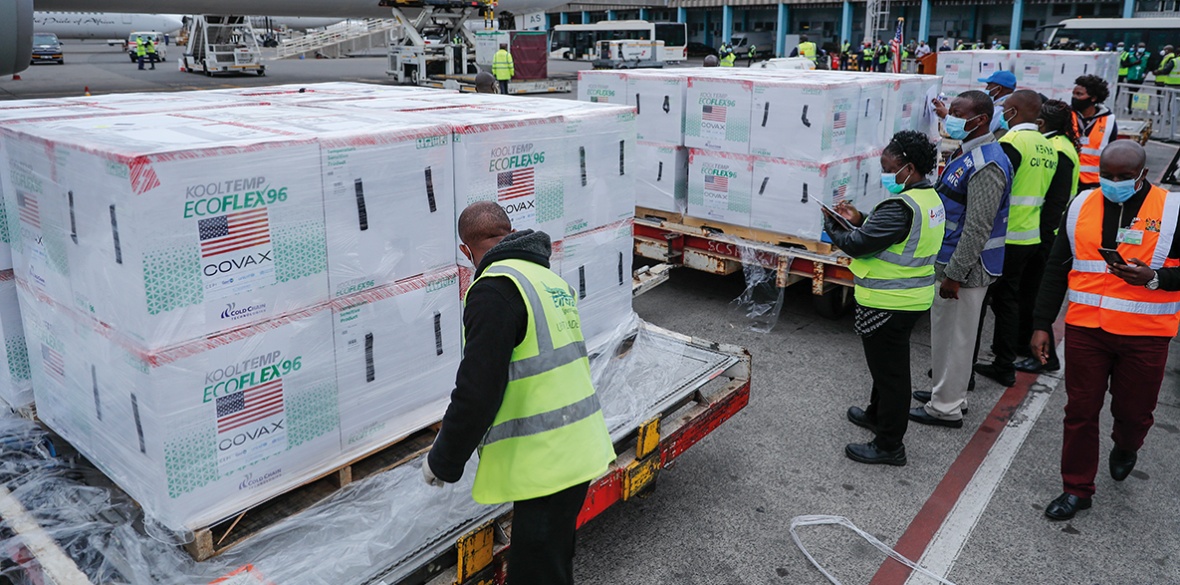This is the last article you can read this month
You can read more article this month
You can read more articles this month
Sorry your limit is up for this month
Reset on:
Please help support the Morning Star by subscribing here
THE stark reality is that of the more than five billion Covid-19 doses administered globally only 2 per cent have been received in the continent of Africa.
In the US, by comparison, around 52 per cent of people are fully vaccinated and in the European Union it is 57 per cent.
Scotland and Wales have vaccinated around 90 per cent of those aged 16 and over with at least one dose while England has reached around 88 per cent and Northern Ireland in the region of 86 per cent.
Of course, I have absolutely no problem with as many people as possible getting vaccinated. We are, after all, not safe unless everyone is safe. This is, indeed, central the point that I want to make.
Africans need more Covid-19 vaccination doses to be available and help to get those doses into as many arms as possible.
The World Health Organisation (WHO) reports an improved supply of vaccine doses to Africa in recent months after the richest countries of the global North agreed to donate directly to African nations or through the global vaccine sharing scheme, Covax.
However, the level of vaccinations actually reaching people is still far too low.
Countries such as the US and Britain signed deals with pharmaceutical companies during 2020 for the vaccines even before the vaccines were available.
This hoarding made it impossible for the Covax scheme, the African Union and individual nations on the continent to secure the doses they so desperately needed.
South Africa, the African country hardest hit by the pandemic, has vaccinated only around 10 per cent of its population.
The inevitable consequence is that the virus is still spreading across the country.
The picture in other parts of Africa is not much better. The most populous country on the continent, Nigeria, has vaccinated less than 1 per cent of its population and Kenya, in the east, only around 1.5 per cent.
Even as the vaccines become available, it’s debatable whether the necessary infrastructure to administer them at the speed required actually exists in these countries and across most of the continent.
While the rich countries of the global North are now planning to offer bolster shots of the vaccine to their populations less fortunate nations of the global South, notably across the continent of Africa, are still gripped by the virus with few prospects of an end to the crisis anytime soon.
The role of big pharma — the giant pharmaceutical companies — must be considered in all of this.
Johnson and Johnson, the giant US company, virtually the definition of a multinational company, produced vaccine doses in South Africa and then, promptly, exported them to Europe.
After being denounced by the South African government and others for this disgraceful behaviour, Johnson and Johnson finally agreed to make more vaccine doses available across African countries.
Johnson and Johnson clearly thought that its original actions were reasonable and that it could get away with it.
It is crystal clear that there needs to be a transformation in how Covid-19 vaccines are manufactured and distributed.
It cannot be left to big pharma to decide how best to tackle public health emergencies such as Covid-19. The only real motive of big pharma will inevitably be profit.
Wherever you live on the planet, given that we are all so interdependent, you must be able to access the means of keeping yourself alive without it depending on how much money you have.
These are all reasons why Liberation supports a people’s vaccine and not a profit vaccine.
This is also, in reality, an argument for an international health service free at the point of delivery for anyone who needs it.
The rich nations of the global North and big pharma cannot be allowed to decide who lives and who dies, which is effectively what is happening at the moment.
The need for a people’s vaccine cannot be looked at just within the context of the current crisis caused by the global pandemic.
More structural change is needed to make sure that if and when anything similar happens again, people of the world are not left to the mercy of big pharma or the benevolence of the richest nations of the global North.
Vaccines should be free of charge to people when they need it and there should be no monopolies held on them by big pharma — especially as often they have been given public funding to carry out their research.
However, much more needs to be done to develop the health infrastructure across the continent of Africa that isn’t just about a response to whatever the latest global or, indeed, local public health emergency might be.
Liberation wants to work more closely with the international trade union movement and other partners to help to build civil society capacity and power around health, housing and other areas such as access to food and water. People power is what will make the difference.
It will only be by building a radical local, national and international movement for fundamental change that prioritises people over profits that it will be possible to take on the likes of big pharma and those governments who seem to dance to whatever tune they decide to play.
Roger McKenzie is general secretary of Liberation and a long-time union and anti-racist organiser.












